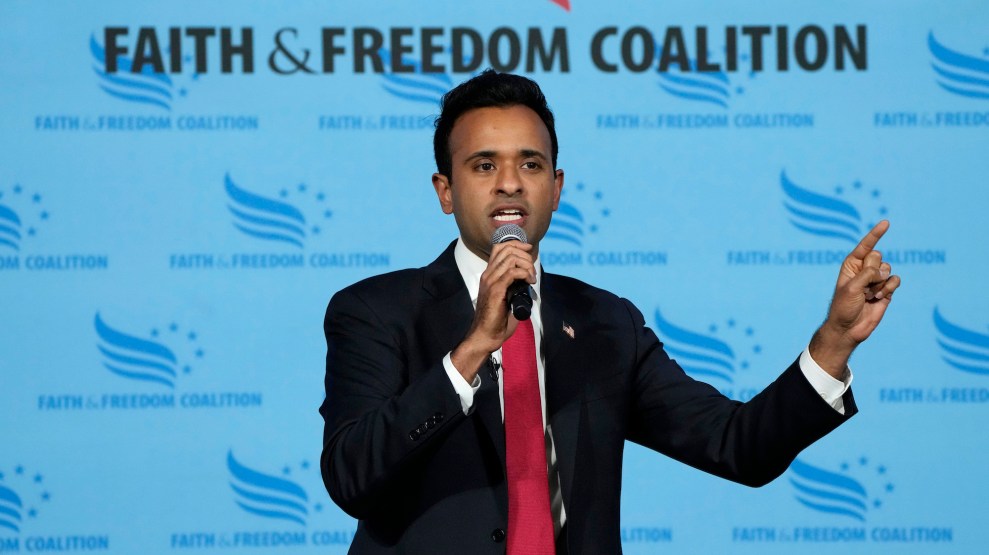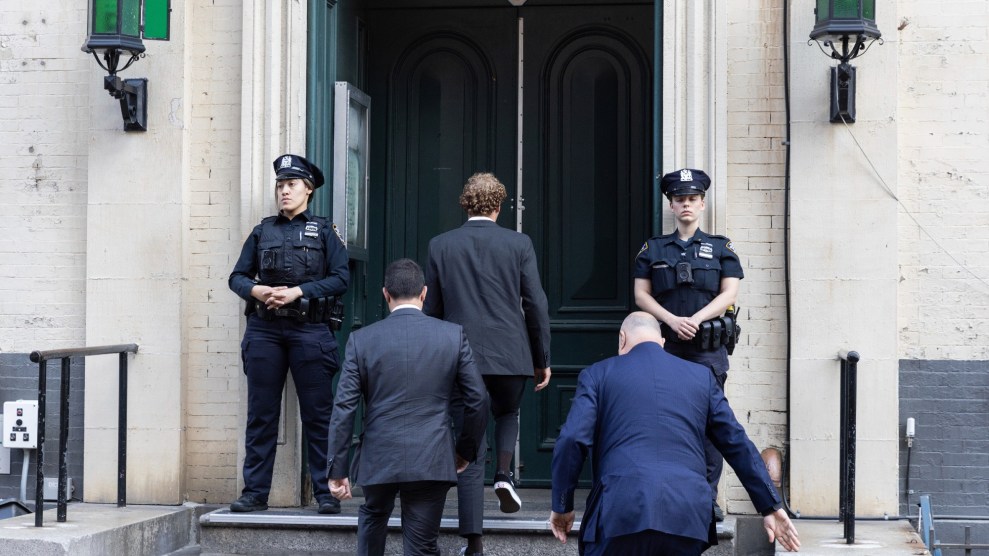
Republican presidential candidate Vivek Ramaswamy speaks at an event in Iowa last month.Charlie Neibergall/AP
After Daniel Penny was charged on Friday with manslaughter for choking Jordan Neely to death on the F train, Gov. Ron DeSantis (R-Fla.) tweeted a link to donate to Penny’s legal defense fund. “We stand with Good Samaritans like Daniel Penny,” DeSantis wrote. “Let’s show this Marine…America’s got his back.”
Other Republicans followed suit. “I agree with this. Just donated,” Vivek Ramaswamy, the self-funding presidential candidate, responded on Sunday. “More of us should. We must restore the rule of law in America.” Ramaswamy gave $10,000, so far the second largest of the more than 46,000 donations totaling over two million dollars sent via the Christian crowdfunding site GiveSendGo.
Earlier this month, Neely, a thirty-year-old unhoused man in the midst of a mental health crisis, made some of his fellow passengers feel uncomfortable and potentially unsafe. A 24-year-old former Marine came from behind and put him in a fatal chokehold for about 15 minutes, even though a bystander said 98 out of 100 people would have waited to see “one more sign that indicates aggression.” DeSantis and others on the right responded by comparing Penny to the Samaritan who provided aid to a man robbers beat and left to die.
As his rivals defended Penny, Donald Trump remained silent on his highly active social media feed—avoiding a chance to attack Alvin Bragg, the New York District Attorney who charged both him and Penny. When asked about Neely’s death in an interview published Monday, Trump was unusually reserved in his support of Penny. “So, I haven’t seen the tapes,” Trump said. “I won’t make a definitive [statement] but it looks to me like the people in that car were in great danger.”
This isn’t totally unprecedented. Force was often justified for Trump—a man who’d once taken out a full-page ad in the New York Times that implied that five Black and Latino teenagers, who were later exonerated, should be executed—but it wasn’t always. In May 2020, four days after Derek Chauvin murdered George Floyd, Trump did not defend what was captured on video and said the Justice Department should investigate as quickly as possible. “It’s a terrible thing. We all saw what we saw,” Trump said. “Should never be allowed to happen a thing like that. But we’re determined that justice be served.” That summer, he wondered why a Wisconsin police officer had shot Jacob Blake in the back multiple times. “Couldn’t you have wrestled him?” Trump asked. “But they choke. Just like in a golf tournament, they miss a three-foot putt.”
Trump’s stance caused some backlash. An editor at Chronicles, a far-right magazine dedicated to defending “the traditions of America and the West,” quickly called Trump’s comments on the death of Neely “pathetic.”
Diverging from Trump, some on the right have attempted to elevate Penny to ever higher levels of valor.
Rep. Matt Gaetz (R-Fla.) called him a “subway Superman.” A New York Post editor wrote that the “only difference between Daniel Penny and the heroic passengers aboard United 93 is he’s been charged with manslaughter by a usually soft-on-crime Manhattan DA.”
On Twitter, Gavin Wax, the head of the New York Young Republican Club captioned a tweet of Penny in handcuffs: “This man is a hero.” Wax then shared a reply from an anonymous user that claimed Penny “is no different than the frontiersmen that settled America – brave and fearless against foes.”
He is no different than the frontiersmen that settled America – brave and fearless against foes #DanielPennyIsAHERO 🇺🇸🇺🇸🇺🇸 https://t.co/cKojFKrUfg
— DesertWind (@brenner_colleen) May 12, 2023
The post effectively adopted a darker narrative, that Penny, who has said he did not intend to harm anyone, was a vigilante eager to kill. The only difference was that this was now presented as something to be celebrated.
















